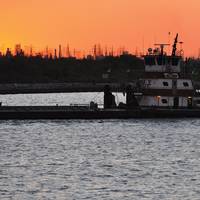Cheap Gas Killing US Coal -Rystad
A new study revealed that coal power is being replaced by cleaner energy sources in the US – primarily due to an abundance of cheap natural gas.According to Rystad Energy, new renewable energy capacity from solar and wind is on the rise in the US, and April 2019 marked the first month when more electricity was generated in the country from renewable sources than from coal.However, the growing renewable energy sector alone is not wholly responsible for the on-going retirement of coal-fired power plants and the essential moratorium on the construction of new coal plants.“The US thermal coal industry is in severe trouble. However, coal’s demise as the fuel of choice for power generators is primarily due to the upsurge of cheap natural gas and not renewable sources of power…
U.S. Shale Gas Shipment to Arrives in Britain
The first shipment of gas fracked from U.S. shale will arrive in Britain next week, upping pressure on Scotland to reassess its opposition to fracking. Chemicals giant Ineos will be importing ethane, obtained from rocks fractured at high pressure, in a foretaste of larger deliveries of liquefied natural gas (LNG) from shale set to reach Europe in 2018. The shipment of ethane, used to make plastics, anti-freeze and detergents, will arrive in Scotland's Firth of Forth on Tuesday, accompanied by a lone Scots piper at sunrise, the company said. The Zurich-headquartered group is against a Scottish moratorium on fracking. It is Britain's biggest shale gas company in terms of acreage and it has promised to share six percent of future shale gas revenue with local residents.
Leaky Equipment, Not Fracking, Behind Tainted US Water -Study
The contamination of water supplies near U.S. shale gas fields appears to be the result of leaky cement wells and casings and not the controversial production technique of hydraulic fracturing, according to a study released on Monday. So-called "fracking" is a way of extracting natural gas from deep layers of rock using high-pressure fluid injections. The method has triggered a surge in U.S. gas production, but raised fears that breaking up rock formations underground could allow gas to seep into drinking water. Scientists from several universities, including Duke, Ohio State, Stanford and Dartmouth, analyzed more than 130 drinking-water well samples overlying the Marcellus and Barnett shale gas formations and attempted to trace the source of any contamination, according to the study.
North Sea – Hope for Declining Production?

Western Europe will continue to rely on imported Russian gas into the 2020s as mature offshore provinces struggle for growth, while large-scale shale gas extraction looks increasingly unlikely in the medium term, according to Douglas Westwood. Following Moscow’s intervention in Ukraine and the resulting strained diplomatic ties with the West, it remains to be seen if North Sea production can rally to support any drop in gas flow from Russia. With many IOCs planning investment into UK offshore fields through enhanced oil recovery (EOR)…
Can Fracking Waste be Carried on the Water?

The barging industry has the answer. It’s nowhere near as complicated as it seems. As shale gas production continues to ramp up across the United States, millions of gallons of wastewater is created through the process of hydraulic fracturing, or fracking. That waste, referred to as shale gas extraction wastewater (SGEWW), or frack water, needs transport to storage and reprocessing facilities around the U.S., including disposal sites in Louisiana, Texas and Ohio. At the moment, the cargo is carried solely by rail and truck.
Shale Gas Risk Management: DNV Launches Recommended Practice
DNV has launched a recommended practice (RP) for the entire life cycle of shale gas extraction, based on risk management principles, industry best practices and standards. The objective is for the RP to form the foundation for future development of a globally recognized standard for safe and sustainable shale gas extraction. DNV is calling for input from industry, regulators, NGOs and other interested parties. “Controversy and conflict are constant themes as proponents and opponents debate the extraction of natural gas,” said Remi Eriksen, CEO of DNV Maritime and Oil & Gas. “Since the RP combines current best practices and standards in the industry with a risk based approach, it can serve as a common reference point and help bridge the gap between parties with opposing views.
Shale Gas Risk Management: DNV Leads the Way
DNV has launched a recommended practice (RP) for the entire life cycle of shale gas extraction, based on risk management principles. The recommended practice provides a reference document for the independent verification of shale gas projects. The objective is for the RP to form the basis for a globally recognised standard for safe and sustainable shale gas extraction. DNV’s recommended practice applies risk management principles, to ensure that threats related to shale gas activities are effectively and efficiently managed in an accurate, balanced, transparent and traceable way. “The overall objective of this Recommended Practice is…







